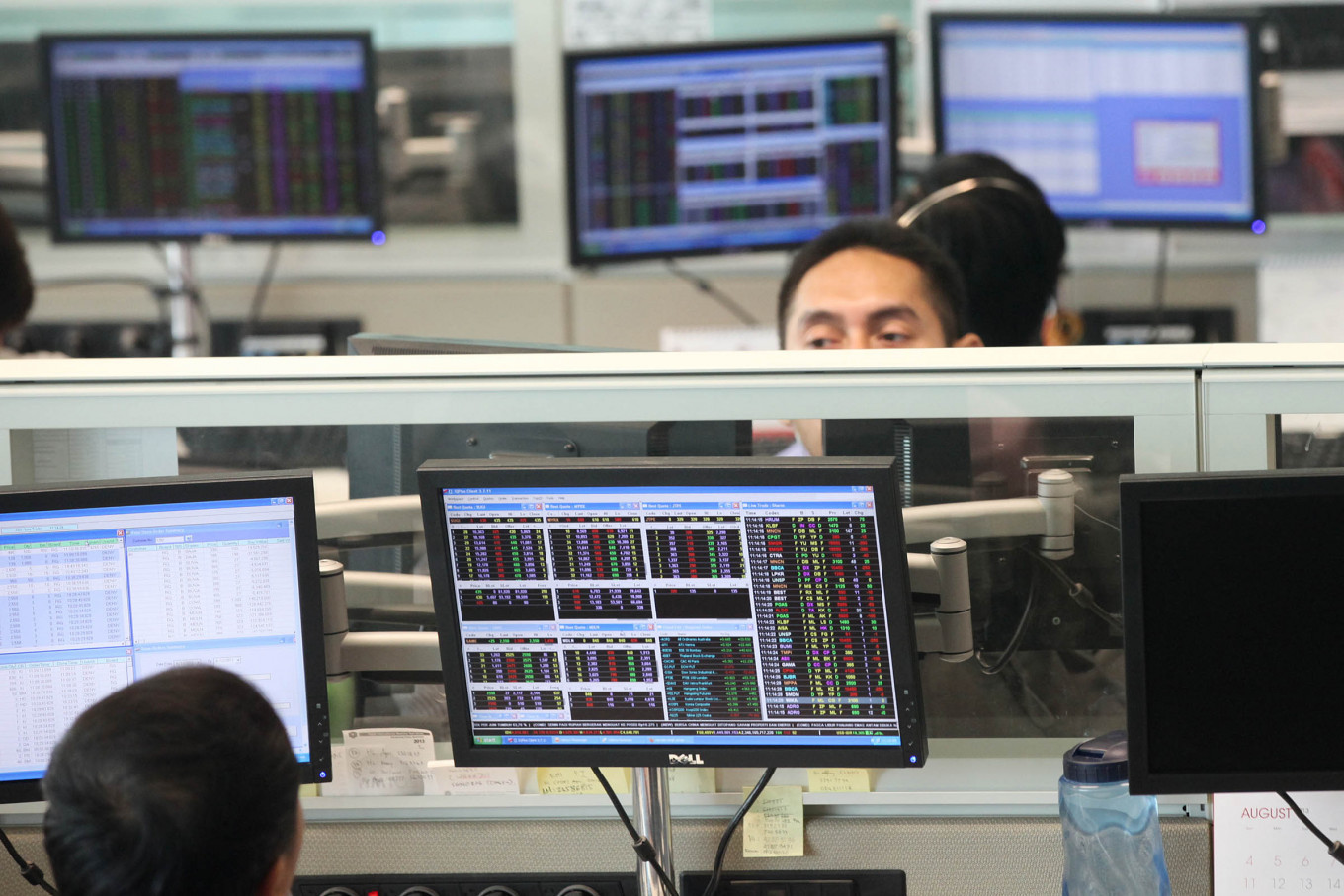Popular Reads
Top Results
Can't find what you're looking for?
View all search resultsPopular Reads
Top Results
Can't find what you're looking for?
View all search resultsDisappearing act: Market braces for volatile March after $2.4b vanishes in a week
Last week alone, foreign investors sold off a net Rp 29.4 trillion in the bond market and Rp 4.2 trillion in the stock market.
Change text size
Gift Premium Articles
to Anyone
T
he central bank and market players are expecting the worst in March as uncertainties surrounding the coronavirus drive volatility in stocks, bonds and foreign exchange markets.
Bank Indonesia (BI) Governor Perry Warjiyo said on Friday that he expected the coronavirus crisis to peak in February and March, before a recovery in the second quarter. The central bank pumped Rp 87 trillion (US$6.2 billion) into the domestic bond market in February to prop up prices and the value of the rupiah as foreign funds sold US$2.4 billion worth of bonds and stocks.
“We project the recovery will take about six months starting in mid-March or April,” Perry said. BI will continue to intervene to stabilize the bond market and the rupiah through the spot market, the domestic non-deliverable forward (NDF) market and by buying government bonds (SBN) in the secondary market, the governor added.
Read also: Coronavirus crash wipes $5 trillion off world stocks
Last week alone, foreign investors sold off a net Rp 29.4 trillion in the bond market and Rp 4.2 trillion in the stock market, according to data compiled by state-owned brokerage firm Mandiri Sekuritas. That rounded up a selling spree of Rp 33.6 trillion or $2.4 billion as countries outside China began to report more cases.
Over the week, the benchmark stock index the Jakarta Composite Index (JCI) fell 7.3 percent and the rupiah depreciated by 4.1 percent against the US dollar. Ten-year Indonesian government bond yields, which indicate investment risk, rose 35 basis points last week to 6.83 percent on Thursday, the third biggest increase after Turkey and Russia.
“The biggest buyer of government bonds month-to-date is Bank Indonesia,” said Mandiri Sekuritas head of fixed income research Handy Yunianto. “Onshore banks also supported the bond market.”
The rupiah weakened to its lowest level since August 2019 on Friday at Rp 14,234 per US dollar, according to the Jakarta Interbank Spot Dollar Rate (JISDOR). Fitch Solutions announced it had revised down the rupiah’s outlook for 2020 from Rp 13,650 to Rp 14,207 against the greenback due to a higher risk of a local coronavirus outbreak.
"The short-term drivers have turned negative due to the elevated global COVID-19 pandemic and likely local outbreak risk," Fitch stated. "We believe that risks of local outbreaks are high, which, once reported, will exert significant downside pressure."
Read also: Coronavirus may weaken rupiah this year: Fitch Solutions
Indonesia has, so far, reported zero cases of coronavirus as countries outside China see more new cases than the country where the virus originated, increasing concerns about a global pandemic that could affect economies beyond the world’s second largest economy. Worldwide, more than 84,000 people have been infected with the virus and 2,870 have died.
“The market does not like uncertainties. As as long as there’s no vaccine, no ability to cure or anything that could prevent spread, the market will continue to be unstable,” Sucor Sekuritas head of business development Bernadus Setya Ananda Wijaya said at a discussion forum in Jakarta on Saturday.
Bernad estimated that recovery would start three months after the peak of the outbreak, which would mean that by April or May the stock market could be more stable, based on the experience from the SARS outbreak in 2002.
The Attorney General’s Office (AGO) plans to begin reopening in March some of the 800 trading accounts that have been suspended for possible links to investment mismanagement by troubled state insurer Jiwasraya, he added, to help support the market.
“Some of these are jumbo accounts that could move Indonesia’s stock market,” said Bernad. “At present, if foreign investors dump, the drop will be steep because there are no jumbo accounts to support.”
The JCI fall would not go below the 5,000 level, about 8 percent lower than its position of 5,452.7 on Friday, analysts said. The benchmark index’s price valuation as measured by the price-to-earnings ratio is currently at 11 times, much lower than the index’s average PER of 16 times.
Sucor Sekuritas is depending on cement, banking and construction stocks to drive growth in the domestic stock market, citing Bank Rakyat Indonesia (BBRI), Summarecon Agung (SMRA), Semen Indonesia (SMGR) and Wijaya Karya (WIKA), among others.










